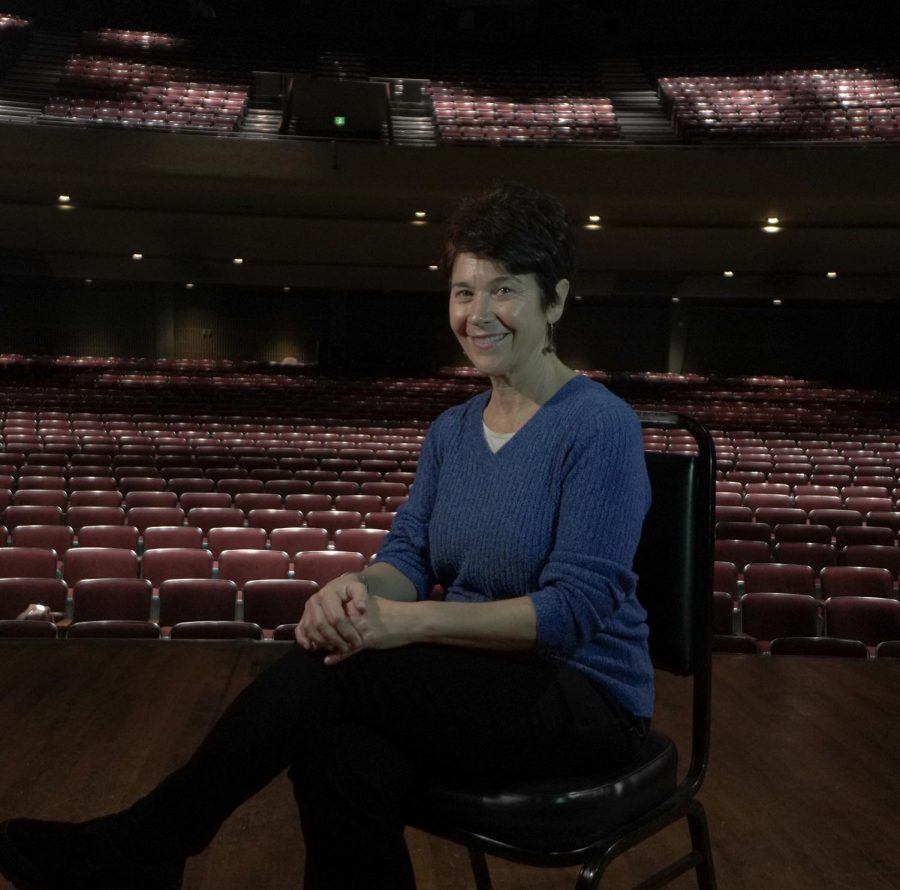El Camino College’s Center of the Arts production manager shares her journey and experiences
El Camino College's Center o the Arts production manager shares her experience working backstage on various productions and her journey to where she is today
June 10, 2018

Rain was pouring in a desert location somewhere in California. Nancy Adler found herself in the yellow slicker and rain pants she was required to wear. Over the radio signal, a request was put in by James Earl Jones for a breakfast burrito and coffee.
It was Nancy’s duty to trot all the way to the catering area, grab a burrito and a warm coffee, and somehow manage carrying these items along with a walkie talkie to James’ trailer while sheltering them all, and herself, rom the rain.
The second assistant director for a major TV movie with an all-star cast, who was in her 20s, finally stood in front of the legendary actor’s trailer door. She knocked and he opened its door.
She did everything she could do keep her composure as she handed James his food. He thanked her and closed the door.
Nancy stood there and something came over her.
No, she was not starstruck by the actor, although she found him quite charming.
Instead, Nancy, as she stood there in the rain, thought to herself, “for this I went to college.”
Nancy came to realize that she was not fond of the television and lm world as she craved to feel as if she was contributing to the art, yet didn’t feel as if she did in her current position.
It was then she realized she just had to go back to her first love: theatre.
Years later, Nancy, who is now 62, did just that. She crawled up the ladder in her career working on the backstage happenings of theatre production that include plays and musicals. Today, she is El Camino’s Center of The Arts production manager and has produced over 50 shows here at El Camino.
Before acquiring this position at El Camino, Nancy not only had experience in theatre, but was somewhat born into it.
She was born in New York City, the city that takes pride in Broadway, the mecca of musicals. A year after she was born, her family moved to London. There Nancy was exposed to children’s theatre. She fell in love with one play in particular and that was “Peter Pan”.
Nancy also had a puppet theatre where she would put on shows for guests at the house.
When she was 12, the family moved back to New York and Nancy finished her schooling there, where she got the lead role in the high school’s musical.
Nancy first started as a drama major in hopes of one day becoming a professional actress for the television screen or theatre, even snatching some acting gigs and roles in her early days.
However, as time passed Nancy and became fascinated with directing and decided to pursue this.
After graduating from Occidental College, she did her best to make it as a second assistant director, which was difficult when there weren’t many female directors back then. It was during this time that she made the realization that the TV and film industry was not her cup of tea. And so Nancy ran back to theatre.
She began to add to her experiences by working in the backstage of a theatre as freelance stage director. Before long, Nancy acquired a job at the Shubert Theatre in Century City that no longer stands today, which was a big break for her.
Her job was to call the popular musical “Cats” as a substitute stage manager. This meant, that while the main stage manager was on vacation, Nancy’s job was to take over and run the show in his absence.
“Calling the ques” or “calling the show” is the stage managers role in the production — the goal is to que every part of the show at the proper time.
“You tell the lights when to go, the sound when to go, the special effects when to go,” Nancy says.
The stage manager usually sits in a booth, sometimes in front or on the side of the theatre, watching over the entire show.
“You’re kind of like an air traffic controller, people say,” Nancy says. “And you’re running everything. You start the show, you finish it.”
“You deal with emergencies,” Nancy continues.
Nancy recalls a moment where she had to stop a show because the curtains had gone down and the actress was standing a tad bit too far front that the curtain fell on her. It was a learning experience for Nancy.
Eventually, Nancy was asked to go on tour all over the United States calling “Cats” where she enjoyed the perks of visiting many states and cities. She found Miami Beach a lot of fun.
Later, she as stage manager for shows at the Shubert, such as Les Miserables, as well as others. And later became a production stage manager at the Long Beach Civic Light Opera. After all this, the opportunity to become production manager fell into her lap when a friend of hers met up for lunch one day.
He previously had this job and had told her about it. She was impressed by the opportunity to still work on backstage happenings while acquiring a steady income.
Being a freelance backstage manager was a rough road, so the production managing position at El Camino sounded appealing to her. When her friend had retired, he contacted her letting her know that position was available.
She applied and got the job.
It all happened ideally for her because it was around the time she got engaged and few years later married and had her daughter.
Nancy has now been the production manager for El Camino’s Center of the Arts for 23 years and is thriving.
Nancy says that the backstage elements and planning are just as important as the actors on stage.
“The average person doesn’t know this. They just think, voila, there’s a show on the stage,” Nancy says. “Months, in fact years, of preparation can go into a play.”
At El Camino, the Center of the Arts division hosts one musical and three plays every year.
Nancy’s job is to produce the play with the budget given to the division by the school.
She also helps in coordinating a team to work on each production with the help of faculty.
Nancy says she would not be able to do her job without her fellow full-time colleagues Ron Scarlarta and Bill Georges.
Together they all come up with titles, in other words, original plays or musicals that they would like to reproduce.
“In choosing titles, I want to make sure we can afford it. I want to make sure we have the rights to do it. I have to apply for the royalties,” Nancy says.
However, sometimes the rights do not get approved for one reason or another.
“For instance, we wanted to produce “‘Chicago: The Musical’ last year, but we were denied the rights,” Nancy says.
So it’s back to the drawing board, Nancy says, and they have a few titles in mind and are hopeful.
When things go well and a title is finalized, Nancy then works with faculty to put a team together.
The first person to be picked is the director of the production. After that, all the designers, from prop designers to costume designers, are picked and the casting calls begin.
Nancy says when putting a team together it she always hopes to bring together a group of people that work well together and who is compatible to the type of production and genre they are putting on.
“It’s a little bit psychology and weighing personalities of people in their specific skills,” Nancy says. “Some light designers are better at lighting darker gloomy pieces. And others do well doing a happy show for instance. It doesn’t mean they (both) couldn’t do both, but I try to weigh all those factors.”
After this, they enter into pre-production mode, which is crafting and preparing for the play or musical.
Nancy can finally breathe once all is done and the first show is put on. She says that the final product all thanks to team effort.
Nancy could not tell you what her favorite show she has produced on campus is.
“It’s like saying who’s your favorite child,” Nancy says.

